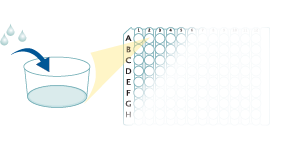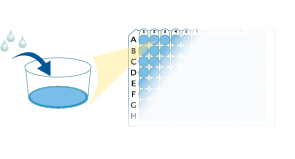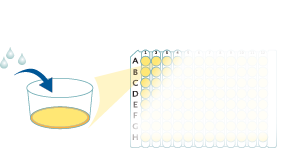Mouse CCL4/MIP-1 beta Quantikine ELISA Kit Summary
Product Summary
Precision
Cell Culture Supernates, Serum, EDTA Plasma
| Intra-Assay Precision | Inter-Assay Precision | |||||
|---|---|---|---|---|---|---|
| Sample | 1 | 2 | 3 | 1 | 2 | 3 |
| n | 20 | 20 | 20 | 20 | 20 | 20 |
| Mean (pg/mL) | 23.1 | 73 | 234 | 23.7 | 77 | 245 |
| Standard Deviation | 2.2 | 4 | 5.4 | 1.7 | 3.4 | 12.5 |
| CV% | 9.5 | 5.5 | 2.3 | 7.2 | 4.4 | 5.1 |
Recovery
The recovery of mouse MIP-1 beta spiked to three levels throughout the range of the assay in various matrices was evaluated.
| Sample Type | Average % Recovery | Range % |
|---|---|---|
| Cell Culture Supernates (n=5) | 104 | 86-118 |
| EDTA Plasma (n=5) | 99 | 87-106 |
| Serum (n=5) | 101 | 93-109 |
Linearity
Scientific Data
Product Datasheets
Preparation and Storage
Background: CCL4/MIP-1 beta
CCL4/MIP-1 beta is a beta chemokine that is secreted at sites of inflammation by activated leukocytes, lymphocytes, vascular endothelial cells, and pulmonary smooth muscle cells. It attracts a variety of immune cells to sites of microbial infection as well as to other pathologic inflammation such as allergic asthma and ischemic myocardium. CCL4 is secreted from activated monocytes as a heterodimer with CCL3/MIP-1 alpha. It signals through CCR5, and an N-terminally trimmed form additionally interacts with CCR1 and CCR2. In humans, the ability of CCL4 to bind CCR5 inhibits the cellular entry of M-tropic HIV-1 which utilizes CCR5 as a coreceptor.
Assay Procedure
Refer to the product- Prepare all reagents, standard dilutions, and samples as directed in the product insert.
- Remove excess microplate strips from the plate frame, return them to the foil pouch containing the desiccant pack, and reseal.
- Add 50 µL of Assay Diluent to each well.
- Add 50 µL of Standard, Control, or sample to each well. Cover with a plate sealer, and incubate at room temperature for 2 hours.
- Aspirate each well and wash, repeating the process 4 times for a total of 5 washes.
- Add 100 µL of Conjugate to each well. Cover with a new plate sealer, and incubate at room temperature for 2 hours.
- Aspirate and wash 5 times.
- Add 100 µL Substrate Solution to each well. Incubate at room temperature for 30 minutes. PROTECT FROM LIGHT.
- Add 100 µL of Stop Solution to each well. Read at 450 nm within 30 minutes. Set wavelength correction to 540 nm or 570 nm.





Citations for Mouse CCL4/MIP-1 beta Quantikine ELISA Kit
R&D Systems personnel manually curate a database that contains references using R&D Systems products. The data collected includes not only links to publications in PubMed, but also provides information about sample types, species, and experimental conditions.
34
Citations: Showing 1 - 10
Filter your results:
Filter by:
-
Human single cell RNA-sequencing reveals a targetable CD8+ exhausted T cell population that maintains mouse low-grade glioma growth
Authors: Barakat, R;Chatterjee, J;Mu, R;Qi, X;Gu, X;Smirnov, I;Cobb, O;Gao, K;Barnes, A;Kipnis, J;Gutmann, DH;
Nature communications
Species: Mouse
Sample Types: Cell Culture Supernates
-
Myocardial infarction augments sleep to limit cardiac inflammation and damage
Authors: Huynh, P;Hoffmann, JD;Gerhardt, T;Kiss, MG;Zuraikat, FM;Cohen, O;Wolfram, C;Yates, AG;Leunig, A;Heiser, M;Gaebel, L;Gianeselli, M;Goswami, S;Khamhoung, A;Downey, J;Yoon, S;Chen, Z;Roudko, V;Dawson, T;Ferreira da Silva, J;Ameral, NJ;Morgenroth-Rebin, J;D'Souza, D;Koekkoek, LL;Jacob, W;Munitz, J;Lee, D;Fullard, JF;van Leent, MMT;Roussos, P;Kim-Schulze, S;Shah, N;Kleinstiver, BP;Swirski, FK;Leistner, D;St-Onge, MP;McAlpine, CS;
Nature
Species: Transgenic Mouse
Sample Types: Plasma
-
LHPP-mediated inorganic pyrophosphate hydrolysis-driven lysosomal acidification in astrocytes regulates adult neurogenesis
Authors: Sha, L;Li, J;Shen, H;Wang, Q;Meng, P;Zhang, X;Deng, Y;Zhu, W;Xu, Q;
Cell reports
Species: Mouse
Sample Types: Cell Culture Supernates
-
Asthma reduces glioma formation by T cell decorin-mediated inhibition of microglia
Authors: J Chatterjee, S Sanapala, O Cobb, A Bewley, AK Goldstein, E Cordell, X Ge, JR Garbow, MJ Holtzman, DH Gutmann
Nature Communications, 2021-12-08;12(1):7122.
Species: Mouse
Sample Types: Cell Culture Supernates
-
Lack of whey acidic protein four disulphide core (WFDC) 2 protease inhibitor causes neonatal death from respiratory failure in mice
Authors: K Nakajima, M Ono, U Radovi?, S Dizdarevi?, SI Tomizawa, K Kuroha, G Naganatsu, I Hoshi, R Matsunaga, T Shirakawa, T Kurosawa, Y Miyazaki, M Seki, Y Suzuki, H Koseki, M Nakamura, T Suda, K Ohbo
Dis Model Mech, 2019-11-12;0(0):.
Species: Mouse
Sample Types: Tissue Homogenates
-
Type I interferon-dependent CCL4 is induced by a cGAS/STING pathway that bypasses viral inhibition and protects infected tissue, independent of viral burden
Authors: NJ Parekh, TE Krouse, IE Reider, RP Hobbs, BM Ward, CC Norbury
PLoS Pathog., 2019-10-11;15(10):e1007778.
Species: Mouse
Sample Types: Cell Culture Supernates
-
Tofacitinib enhances delivery of antibody-based therapeutics to tumor cells through modulation of inflammatory cells
Authors: N Simon, A Antignani, SM Hewitt, M Gadina, C Alewine, D FitzGerald
JCI Insight, 2019-03-07;0(0):.
Species: Mouse
Sample Types: Serum
-
CCL3 augments tumor rejection and enhances CD8+T cell infiltration through NK and CD103+dendritic cell recruitment via IFN?
Authors: F Allen, ID Bobanga, P Rauhe, D Barkauskas, N Teich, C Tong, J Myers, AY Huang
Oncoimmunology, 2017-11-20;7(3):e1393598.
Species: Mouse
Sample Types: Serum
Applications: ELISA Capture -
PD-1 blockade enhances elotuzumab efficacy in mouse tumor models
Authors: NA Bezman, A Jhatakia, AY Kearney, T Brender, M Maurer, K Henning, MR Jenkins, AJ Rogers, PJ Neeson, AJ Korman, MD Robbins, RF Graziano
Blood Adv, 2017-05-08;1(12):753-765.
Species: Mouse
Sample Types: Tissue Homogenates
-
Behavioural traits propagate across generations via segregated iterative-somatic and gametic epigenetic mechanisms
Nat Commun, 2016-05-13;7(0):11492.
Species: Mouse
Sample Types: Plasma
-
CCL3 production by microglial cells modulates disease severity in murine models of retinal degeneration.
Authors: Kohno H, Maeda T, Perusek L, Pearlman E, Maeda A
J Immunol, 2014-03-17;192(8):3816-27.
Species: Mouse
Sample Types: Tissue Homogenates
-
Cleavage of the T cell protein tyrosine phosphatase by the hepatitis C virus nonstructural 3/4A protease induces a Th1 to Th2 shift reversible by ribavirin therapy.
Authors: Brenndorfer E, Brass A, Karthe J, Ahlen G, Bode J, Sallberg M
J Immunol, 2014-01-17;192(4):1671-80.
Species: Mouse
Sample Types: Cell Lysates
-
Interferon gamma-induced intratumoral expression of CXCL9 alters the local distribution of T cells following immunotherapy with
Authors: Guirnalda P, Wood L, Goenka R, Crespo J, Paterson Y
Oncoimmunology, 2013-07-23;2(8):e25752.
Species: Mouse
Sample Types: Tissue Homogenates
-
Potential roles of CCR5(+) CCR6(+) dendritic cells induced by nasal ovalbumin plus Flt3 ligand expressing adenovirus for mucosal IgA responses.
Authors: Fukuyama Y, Tokuhara D, Sekine S, Aso K, Kataoka K, Davydova J, Yamamoto M, Gilbert R, Tokuhara Y, Fujihashi K, Kunisawa J, Yuki Y, Kiyono H, McGhee J, Fujihashi K
PLoS ONE, 2013-04-02;8(4):e60453.
Species: Mouse
Sample Types: Cell Culture Supernates
-
Modelling of mouse experimental colitis by global property screens: a holistic approach to assess drug effects in inflammatory bowel disease.
Authors: Gottfries J, Melgar S, Michaelsson E
PLoS ONE, 2012-01-18;7(1):e30005.
Species: Mouse
Sample Types: Tissue Homogenates
-
CCR5 is involved in resolution of inflammation in proteoglycan-induced arthritis.
Authors: Doodes PD, Cao Y, Hamel KM, Wang Y, Rodeghero RL, Kobezda T, Finnegan A
Arthritis Rheum., 2009-10-01;60(10):2945-53.
Species: Mouse
Sample Types: Serum
-
Endotoxin augmented antigen-induced Th1 cell trafficking amplifies airway neutrophilic inflammation.
Authors: Mikhak Z, Farsidjani A, Luster AD
J. Immunol., 2009-06-15;182(12):7946-56.
Species: Mouse
Sample Types: BALF
-
TLR9 agonist, but not TLR7/8, functions as an adjuvant to diminish FI-RSV vaccine-enhanced disease, while either agonist used as therapy during primary RSV infection increases disease severity.
Authors: Johnson TR, Rao S, Seder RA, Chen M, Graham BS
Vaccine, 2009-04-03;27(23):3045-52.
Species: Mouse
Sample Types: Cell Culture Supernates
-
Role of the chemokine decoy receptor D6 in balancing inflammation, immune activation, and antimicrobial resistance in Mycobacterium tuberculosis infection.
Authors: Di Liberto D, Locati M, Caccamo N, Vecchi A, Meraviglia S, Salerno A, Sireci G, Nebuloni M, Caceres N, Cardona PJ, Dieli F, Mantovani A
J. Exp. Med., 2008-08-11;205(9):2075-84.
Species: Mouse
Sample Types: Serum
-
Pulmonary eosinophilia requires interleukin-5, eotaxin-1, and CD4+ T cells in mice immunized with respiratory syncytial virus G glycoprotein.
Authors: Johnson TR, Rothenberg ME, Graham BS
J. Leukoc. Biol., 2008-06-02;84(3):748-59.
Species: Mouse
Sample Types: Tissue Homogenates
-
The direct action of 1alpha,25(OH)2-vitamin D3 on purified mouse Langerhans cells.
Authors: Fujita H, Asahina A, Komine M, Tamaki K
Cell. Immunol., 2007-05-15;245(2):70-9.
Species: Mouse
Sample Types: Cell Culture Supernates
-
CCL4 protects from type 1 diabetes by altering islet beta-cell-targeted inflammatory responses.
Authors: Meagher C, Arreaza G, Peters A, Strathdee CA, Gilbert PA, Mi QS, Santamaria P, Dekaban GA, Delovitch TL
Diabetes, 2007-03-01;56(3):809-17.
Species: Mouse
Sample Types: Serum
-
Cannabinoid-2 receptor mediates protection against hepatic ischemia/reperfusion injury.
Authors: Batkai S, Osei-Hyiaman D, Pan H, El-Assal O, Rajesh M, Mukhopadhyay P, Hong F, Harvey-White J, Jafri A, Hasko G, Huffman JW, Gao B, Kunos G, Pacher P
FASEB J., 2007-02-27;21(8):1788-800.
Species: Mouse
Sample Types: Tissue Homogenates
-
Deficiency of P-selectin or P-selectin glycoprotein ligand-1 leads to accelerated development of glomerulonephritis and increased expression of CC chemokine ligand 2 in lupus-prone mice.
Authors: He X, Schoeb TR, Panoskaltsis-Mortari A, Zinn KR, Kesterson RA, Zhang J, Samuel S, Hicks MJ, Hickey MJ, Bullard DC
J. Immunol., 2006-12-15;177(12):8748-56.
Species: Mouse
Sample Types: Tissue Homogenates
-
Local production of chemokines and prostaglandin E2 in the acute, chronic and recovery phase of murine experimental colitis.
Authors: Drmotova M, Rehnstrom E, Jansson L
Cytokine, 2006-11-07;35(5):275-83.
Species: Mouse
Sample Types: Tissue Homogenates
-
Organ-specific role of MyD88 for gene regulation during polymicrobial peritonitis.
Authors: Weighardt H, Mages J, Jusek G, Kaiser-Moore S, Lang R, Holzmann B
Infect. Immun., 2006-06-01;74(6):3618-32.
Species: Mouse
Sample Types: Tissue Homogenates
-
Immunosuppressant triptolide inhibits dendritic cell-mediated chemoattraction of neutrophils and T cells through inhibiting Stat3 phosphorylation and NF-kappaB activation.
Authors: Liu Q, Chen T, Chen G, Li N, Wang J, Ma P, Cao X
Biochem. Biophys. Res. Commun., 2006-05-12;345(3):1122-30.
Species: Mouse
Sample Types: Cell Culture Supernates
-
Immunization with gp120-depleted whole killed HIV immunogen and a second-generation CpG DNA elicits strong HIV-specific responses in mice.
Authors: Trabattoni D, Clivio A, Bray DH, Bhagat L, Beltrami S, Maffeis G, Cesana E, Lowry P, Lissoni F, Kandimalla ER, Sullivan T, Agrawal S, Bartholomew R, Clerici M
Vaccine, 2005-09-22;24(9):1470-7.
Species: Mouse
Sample Types: Cell Culture Supernates
-
Vbeta14(+) T cells mediate the vaccine-enhanced disease induced by immunization with respiratory syncytial virus (RSV) G glycoprotein but not with formalin-inactivated RSV.
Authors: Johnson TR, Varga SM, Braciale TJ, Graham BS
J. Virol., 2004-08-01;78(16):8753-60.
Species: Mouse
Sample Types: Tissue Homogenates
-
The role of gammadelta T cells in the regulation of neutrophil-mediated tissue damage after thermal injury.
Authors: Toth B, Alexander M, Daniel T, Hubbard WJ, Schwacha MG
J. Leukoc. Biol., 2004-06-14;76(3):545-52.
Species: Mouse
Sample Types: Plasma
-
Effects of poly(ADP-ribose) polymerase inhibition on inflammatory cell migration in a murine model of asthma.
Authors: Virag L, Bai P, Bak I, Pacher P, Mabley JG, Liaudet L, Bakondi E, Gergely P, Kollai M, Szabo C
Med. Sci. Monit., 2004-03-01;10(3):BR77-83.
Species: Mouse
Sample Types: BALF
-
Role of the autocrine chemokines MIP-1alpha and MIP-1beta in the metastatic behavior of murine T cell lymphoma.
Authors: Menten P, Saccani A, Dillen C, Wuyts A, Struyf S, Proost P, Mantovani A, Wang JM, Van Damme J
J. Leukoc. Biol., 2002-10-01;72(4):780-9.
Species: Mouse
Sample Types: Cell Culture Supernates
-
Immunostimulatory DNA-based vaccines elicit multifaceted immune responses against HIV at systemic and mucosal sites.
Authors: Horner AA, Datta SK, Takabayashi K, Belyakov IM, Cinman N, Nguyen MD, Van Uden JH, Berzofsky JA
J. Immunol., 2001-08-01;167(3):1584-91.
Species: Mouse
Sample Types: Cell Culture Supernates
-
Inhibition of lipopolysaccharide-induced signal transduction in endotoxin-tolerized mouse macrophages: dysregulation of cytokine, chemokine, and toll-like receptor 2 and 4 gene expression.
Authors: Medvedev AE, Kopydlowski KM, Vogel SN
J. Immunol., 2000-06-01;164(11):5564-74.
Species: Mouse
Sample Types: Cell Culture Supernates
FAQs
No product specific FAQs exist for this product, however you may
View all ELISA FAQsReviews for Mouse CCL4/MIP-1 beta Quantikine ELISA Kit
Average Rating: 4 (Based on 1 Review)
Have you used Mouse CCL4/MIP-1 beta Quantikine ELISA Kit?
Submit a review and receive an Amazon gift card.
$25/€18/£15/$25CAN/¥75 Yuan/¥2500 Yen for a review with an image
$10/€7/£6/$10 CAD/¥70 Yuan/¥1110 Yen for a review without an image
Filter by:







